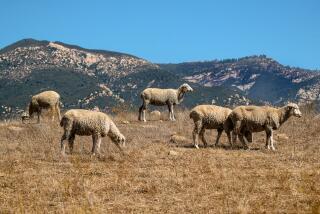For State or Heirs? : Gentleman Farmer Faces Dilemma: What to Do With His Land?
- Share via
WHITEHOUSE, N.J. — Stanley Baron’s argument for preserving farmland is right outside his picture window, which frames a view of sheep grazing on alfalfa hay under ash and hemlock trees.
“I can’t think of any explanation better than asking you to look out that window,” Baron told a visitor to his sheep farm 40 minutes from New York City. “If you could preserve something like that, wouldn’t you do so?”
Baron has been a leader in saving farmland--and yet he illustrates a dilemma posed by new programs compensating farmers who agree to deed restrictions that keep their lands forever undeveloped.
Last October, he sold to the state of New Jersey the development rights to a second farm he owns, an 85-acre site in nearby Neshanic on which he grows alfalfa to feed his sheep.
But he doesn’t plan to sell the state the development rights to the 86-acre sheep farm in Whitehouse. When he dies, he said, his five children can decide.
“My heirs don’t think highly of the program,” he said. “They’d rather see the land unencumbered so they can do with it whatever they like after I die. . . . They’ve never said that. I should only say that my heirs have different circumstances. One of my heirs has two children. He’s out . . . earning a living. And he says: ‘Hey, what’s going on? Why give it to the state? You can sell it differently.’ ”
Under New Jersey’s farmland preservation program, the farmer is paid the difference between the assessed value of the land for farm production and its worth for development into housing or commercial use. The state and counties share the cost.
Baron stumbled into farming as a second career at age 50. He had owned a paper-bag manufacturing plant in New Jersey but lived in New York and became fed up with the traffic jams on his commute.
One day while driving with his wife, Nancy, he made a wrong turn and ended up in the farmland of Hunterdon County.
“I said: ‘Why don’t we find a place right here?’ She went out and shopped and then found this place. This had been a dairy farm before we took over. It was empty of equipment and empty of animals. I was wondering what we were going to do to keep the grass down. Nancy said: ‘Sheep. I can handle sheep. They’re small enough for me.’ ”
They moved to the Whitehouse farm in 1970. Baron sold his paper business in 1979 and became a full-time farmer, now with a herd of 1,000.
“I love it,” he said. “I tell you, the best years of my life.”
More to Read
Sign up for Essential California
The most important California stories and recommendations in your inbox every morning.
You may occasionally receive promotional content from the Los Angeles Times.












